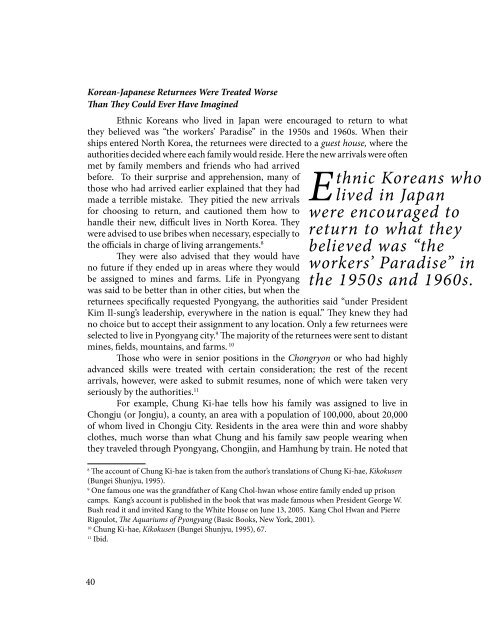Taken_LQ
Taken_LQ
Taken_LQ
Create successful ePaper yourself
Turn your PDF publications into a flip-book with our unique Google optimized e-Paper software.
Korean-Japanese Returnees Were Treated Worse<br />
Than They Could Ever Have Imagined<br />
Ethnic Koreans who lived in Japan were encouraged to return to what<br />
they believed was “the workers’ Paradise” in the 1950s and 1960s. When their<br />
ships entered North Korea, the returnees were directed to a guest house, where the<br />
authorities decided where each family would reside. Here the new arrivals were often<br />
met by family members and friends who had arrived<br />
Ethnic Koreans who<br />
lived in Japan<br />
were encouraged to<br />
return to what they<br />
believed was “the<br />
workers’ Paradise” in<br />
the 1950s and 1960s.<br />
before. To their surprise and apprehension, many of<br />
those who had arrived earlier explained that they had<br />
made a terrible mistake. They pitied the new arrivals<br />
for choosing to return, and cautioned them how to<br />
handle their new, difficult lives in North Korea. They<br />
were advised to use bribes when necessary, especially to<br />
the officials in charge of living arrangements. 8<br />
They were also advised that they would have<br />
no future if they ended up in areas where they would<br />
be assigned to mines and farms. Life in Pyongyang<br />
was said to be better than in other cities, but when the<br />
returnees specifically requested Pyongyang, the authorities said “under President<br />
Kim Il-sung’s leadership, everywhere in the nation is equal.” They knew they had<br />
no choice but to accept their assignment to any location. Only a few returnees were<br />
selected to live in Pyongyang city. 9 The majority of the returnees were sent to distant<br />
mines, fields, mountains, and farms. 10<br />
Those who were in senior positions in the Chongryon or who had highly<br />
advanced skills were treated with certain consideration; the rest of the recent<br />
arrivals, however, were asked to submit resumes, none of which were taken very<br />
seriously by the authorities. 11<br />
For example, Chung Ki-hae tells how his family was assigned to live in<br />
Chongju (or Jongju), a county, an area with a population of 100,000, about 20,000<br />
of whom lived in Chongju City. Residents in the area were thin and wore shabby<br />
clothes, much worse than what Chung and his family saw people wearing when<br />
they traveled through Pyongyang, Chongjin, and Hamhung by train. He noted that<br />
8<br />
The account of Chung Ki-hae is taken from the author’s translations of Chung Ki-hae, Kikokusen<br />
(Bungei Shunjyu, 1995).<br />
9<br />
One famous one was the grandfather of Kang Chol-hwan whose entire family ended up prison<br />
camps. Kang’s account is published in the book that was made famous when President George W.<br />
Bush read it and invited Kang to the White House on June 13, 2005. Kang Chol Hwan and Pierre<br />
Rigoulot, The Aquariums of Pyongyang (Basic Books, New York, 2001).<br />
10<br />
Chung Ki-hae, Kikokusen (Bungei Shunjyu, 1995), 67.<br />
11<br />
Ibid.<br />
about 70 percent of the population were farmers and the rest were laborers. The<br />
area had one store, one cafeteria, and one post office. Residents used “Ryangkwon,”<br />
or coupons, for buying necessities at these facilities. About 20 Korean families from<br />
Japan moved into this area during the years of the Returnee Project. 12<br />
They soon learned that they would be under strict surveillance. KWP<br />
secretaries and the manager of their factory visited the new arrivals every day. The<br />
internal security police warned Chung and his family not to become friends with<br />
certain locals and recent arrivals. The internal security personnel urged residents to<br />
inform on one another in order to weed out those who were rebellious or critical of<br />
authority. 13<br />
The returnees quickly learned to be circumspect about what they said. For<br />
example, Party members brought tomatoes to them and asked whether Chung and<br />
his family had ever eaten them before. Chung’s family had of course eaten tomatoes<br />
in Japan, but stayed quiet and placated the KWP representatives by showing false<br />
gratitude. 14<br />
Fear became a constant feature of their lives. Chung’s memoirs tell of<br />
numerous times when local authorities forced workers and farmers to watch their<br />
compatriots’ public trials and executions. 15<br />
In 1965, Chung was arrested for “spying.” He was reported to have said,<br />
when talking with five of his returnee friends, that life was so stressful that he<br />
wished to go back to Japan. Though he had mentioned it in passing, one of his<br />
friends later reported this comment. Five of the six returnees who were talking that<br />
day, including Chung, were arrested by the Ministry of Public Security (MSP) and<br />
sent to a prison cell at the far North of Hyesan City. For four months, Chung was<br />
interrogated and suffered from malnourishment and exposure. He was forced to<br />
testify that he was a spy.<br />
This experience haunted Chung for the rest of his time in North Korea<br />
because his neighbors and fellow factory workers saw him differently than they did<br />
before his arrest. Being friends with Chung would mean nothing but trouble for<br />
others. In 1981, 16 years after he was released from prison, Chung was targeted by<br />
MPS personnel who had come to the factory to find spies. Chung was criticized in<br />
front of all the workers regarding his arrest on suspicion of spying. Chung tried to<br />
explain how he was proven innocent and released, but it was of no use. 16<br />
12<br />
Ibid.<br />
13<br />
Ibid.<br />
14<br />
Ibid.<br />
15<br />
Ibid.<br />
16<br />
Ibid. 218-220.<br />
40 41


